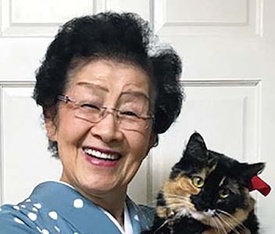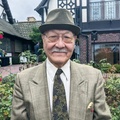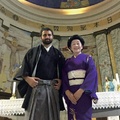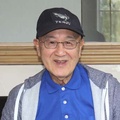It has been announced that the NHK morning drama series starting this fall will be " Come Come Everybody, " a drama about three generations of a grandmother, mother, and daughter spanning the Showa, Heisei, and Reiwa eras. "Come Come Everybody" is the title of the opening song for NHK's radio English course, commonly known as "Come Come English," which swept across Japan just after the end of the war. The family of the late Hirakawa Tadaichi, a lecturer on the program who was affectionately known as "Uncle Come Come," was delighted by the news that a morning drama based on the English course would be produced. When we spoke to Tadaichi Hirakawa's second daughter, Mary Ohno, who teaches Japanese dance and Nagauta shamisen based in the Seattle and Tacoma area, the story of three generations of "Come Come Everybody" in Seattle emerged against the backdrop of the history between Japan and the United States.
* * * * *
Excitement over morning drama decision
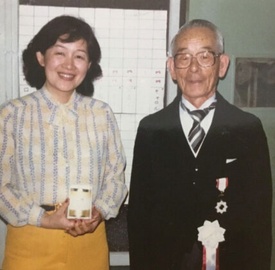
Hirakawa Yuichi's second son, Kiyoshi, who lives in Setagaya, Tokyo, received a call from NHK about the morning drama for the second half of this year in July of last year. The good news was immediately sent to America. "When I heard about it from my brother, I was shocked. He didn't seem to understand the magnitude of the situation, but I watch the morning drama every day here.
"My friend is also happy about the wonderful news. My father's life was full of ups and downs, so it's fitting that it would be made into a drama," said Mary. "In Tokyo, the surviving members of the Kamkam Club English conversation class are also very happy. And in my father's hometown, Okayama." At Tsugawa General Hall in Takahashi City, Okayama Prefecture, a banner celebrating the announcement of the drama, named after the local "Uncle Kamkam," was hung. The park near Yuiichi's birthplace is named Kinoyama Kamkam Park.
The Birth of Uncle Kam Kam
Uncle Kamkam, aka Yuichi, was born in 1902 as the second son of a farming family in Tsugawa Village, Okayama Prefecture (now Takahashi City). His father, Sadajiro, went to America to earn money and worked on the railroad. According to books such as "Hokubei Hyakunen Sakura" (The Centennial Cherry Blossoms of North America) (by Kazuo Ito), many workers were needed at the time for inland maintenance work on railroad tracks on the Great Northern Railroad and the Northern Pacific Railroad, and hundreds of workers were sent by ship from Japan to Seattle and Portland at a time. For those who worked on the railroad in the mountains, Seattle was a food supply base where soy sauce and other items could be ordered, and it was a town where they could take their holidays to replenish their nutrients and do some shopping.
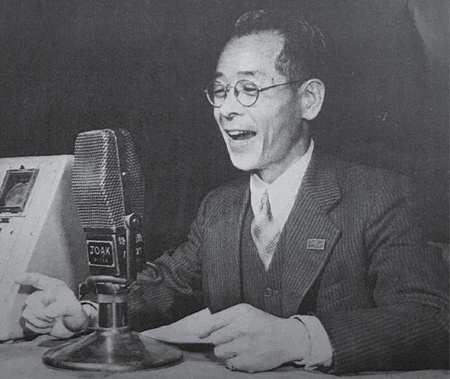
His father had only returned from America once, and hadn't been back for a long time since then. So Yuichi wrote him a letter, asking him to come back soon, and he sent him a travel allowance, asking if the two of them would like to come too. In 1918, at the age of 16, Yuichi left for America with his brother. After working on the railroad together for about a year, their father returned to Japan, but the brothers decided to stay in America, taking advantage of the opportunity.
His older brother Ryuichi returned to Japan after studying auto repair at a driving school. Yuichi first worked at a store in Seattle's Japanese town, but struggled to serve customers because he couldn't speak English. So he decided to live with an American family as a schoolboy and go to school while working. He was told that it was difficult to call him Tadaichi, so he chose the name Joe. From then on, he became Joe Hirakawa and started school with younger children, skipping grades and completing the eighth grade three years later. He went on to Broadway High School (now Seattle Central College) and then the University of Washington.
He initially studied physics with the goal of becoming an inventor, but after a year he changed his plans and graduated with a major in theater. In 1931 he moved to Los Angeles, where he met and married Yone-san, who was from Tokyo. In 1937, the family returned to Japan with their first son. That fall he got a job as an announcer for JOAK International Broadcasting (now NHK Radio International). It was a tough challenge, with more than 50 people applying for two positions. "My father was a lucky man, and on the morning of his job interview, he translated one of the commentary articles that had appeared in the newspaper that day into English, and by chance it turned up as an assignment for the exam," says Mary. In August 1945, as the chief announcer for the international department, he translated the Emperor's surrender broadcast into English and broadcast it to the world.
After Yui left NHK, he was once again asked by NHK to teach an English radio course. After Japan lost the war, the GHQ (General Headquarters of the Allied Powers), which implemented the occupation policy, was promoting the spread of English throughout the country. "The war ended in August 1945, I was born in November of that year, and the English course began on February 1 the following year. I grew up listening to my father's voice on the radio ever since I was a baby."
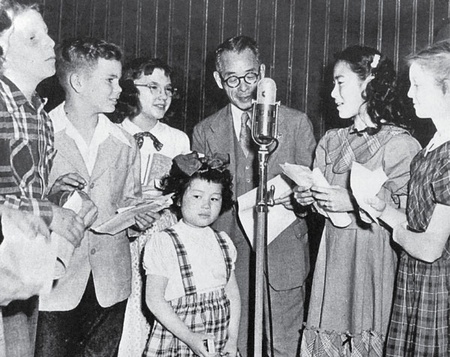
The English lesson began with a theme song of "Come Come Everybody" set to the well-known melody of "Shojoji Tanukibayashi," and quickly became a popular program. Based on his own experience of learning English from scratch in America, he said, "The best way to learn a language is to become a baby," and "You have to learn a foreign language while having fun and playing," and the program's simple English conversations, based on everyday life, were broadcast nationwide. The program, which was also intended to bring back at least a little laughter and brightness to Japan, which was in a state of collapse after the war, attracted a wide range of people, from children to people in their 80s.
After five years on NHK, Come Come English continued on commercial TV, and Uncle Come Come's cheerful and calm voice continued to be heard on the radio for almost ten years. During that time, he received over 500,000 fan letters. This shows how many people looked forward to the broadcast and listened to the 15-minute broadcast from 6:00 pm on weekdays.
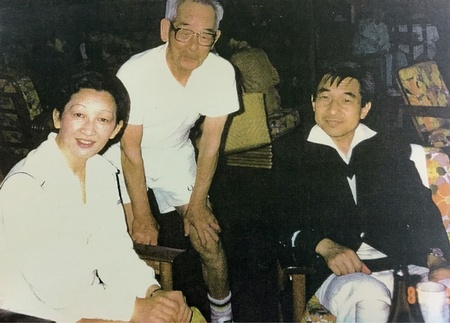
*This article is reprinted from Seattle lifestyle magazine Soy Source (published on March 13, 2021).
© 2021 Akiko Kusunose / Soy Source


